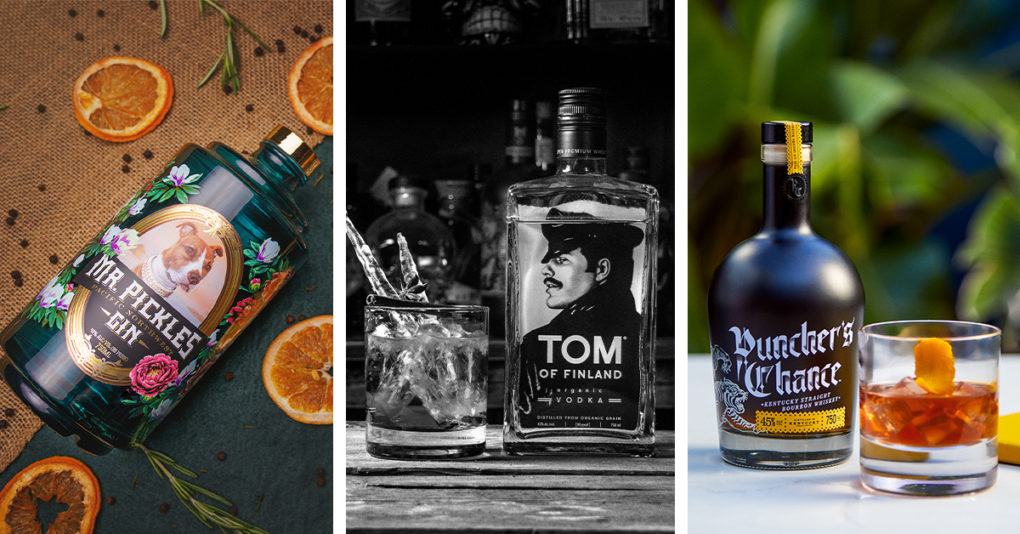
“I think there’s an opportunity to almost reimagine the category potentially in glass and potentially at a higher price and potentially for a more sophisticated audience,” said Tim Nicholls, the managing director of the company’s RTD division, launching next month. “And of course, margins are good there as well.”
Nicholls was formerly CMO of Hard Rock branded RTD cocktails, which he launched in the U.S., Europe, Australia and Taiwan. He’s also held several lead marketing roles for Beso Del Sol Sangria and Reed’s, Inc. Now, he’s charged with expanding the super and ultra premium Wolf Spirit portfolio into the prepared cocktail market.
Launched in 2020 by former Campari America CMO Umberto Luchini, the company is on track to deliver close to 25,000 nine-liter cases in 2023, which is more than double its 2022 numbers. The company’s Puncher’s Chance Bourbon is in all 50 states, and its two vodka offerings – Blood x Sweat x Tears and Tom of Finland – are available in more than 35 states. It recently launched a new gin and announced the addition of Wendy Dunlap, formerly of William Grant & Sons, as vice president of national accounts and on-premise.
Nicholls is hoping to translate the positioning as an independent portfolio of high quality craft spirits into the RTD category by taking cues from the U.K., where on a recent visit he observed more bottled upscale cocktails in glass and more in ready-to-serve (RTS) formats.
“Don’t get me wrong, the party in a can is huge and it’s an extremely attractive space,” he said. “But you’ve got to have a reason to go in there because there are so many competitors, so we’re trying to take the high ground.”
Wolf Spirit is not the only one looking for growth in the premium RTS segment. This month, Pernod Ricard introduced The Glenlivet Twist & Mix Cocktails, a new line of premium, Scotch whisky-based cocktails outfitted with a unique mixing technology. The new 375 ml multi-serve bottle was aimed at expanding the single malt scotch audience and drinking occasions. Other major spirit groups have also recently expanded sizes or launched new premium RTS offerings in 750 ml formats, including Beam Suntory’s Delola and Bacardi’s Grey Goose Martini.
“There are one or two brands out there, but I think there’s an opportunity to do better, to taste better, to be a more powerful brand, and to appeal to a more sophisticated space,” Nicholls said.
But as of now, RTS products represent a niche piece of total spirit sales (0.3%) with total off-premise sales over $300 million in the past 52 weeks ending July 8 according to NIQ’s mid-year RTD report. RTS has actually faced small declines year-over-year, with volumes shifting to traditional spirits categories like tequila and whiskey. While sales have declined 0.1% since last year, alternative pack sizes and super premium (+395.7%) and ultra premium (+12.1%) are growing bright spots. RTS is also gaining volume from categories like still and sparkling wine, suggesting that high-quality cocktails out of the bottle are serving as an up-and-coming wine replacement for consumers entertaining at home.
Nicholls added that he sees potential in higher ABV products, which is driving growth for RTS sales: products 20-29% ABV grew 111.8% since last year, and 30+% ABV products rose 87.1% in off-premise channels. Part of that strategy is being careful about “undermining the mothership,” and avoiding how other spirit brands have approached the category “looking for incremental volume in a lower-ABV canned cocktails.”
The company will follow its typical rollout strategy, focusing “narrow and deep” in limited markets and gaining loyal customers before expanding.
“Once you prove the concepts, once you’ve got people buying it on a regular basis and your velocities are good, everything becomes easier with distributors and investors,” he said.
The company’s most successful channels are major national retail chains such as Total Wine & Spirits, Publix, Kroger and Bevmo, as well as key independent retailers, according to Luchini. On the horizon, it expects some “big wins” on-premise with regional chain accounts, he added. Channel placement will come down to leveraging the relationships the company has where the brand fits, said Nicholls.
“So if it’s a reasonably upscale RTS brand it’s gonna sit next to spirits that are premium brands,” he said. “But what’s exciting about this category is that you’re unlocking new places where you can sell more stuff than you did before in most places.”
What he means is hotel chains, cruise ships, and the untraditional on-premise locations other higher-end RTD brands like BTL SVC started targeting before the pandemic. Pre-mixed cocktails now represent approximately 10% of spirits sales on-premise and it’s growing even faster than in the off-premise relative to mainstream spirits, according to a new report from SipSource. Off-premise food and liquor are important channels for RTS (39% of dollar share and 34% respectively according to NIQ), and convenience represents the biggest off-premise growth opportunity— although that may differ for higher-end products.
Building on his international experience, Nicholls also has his sights set beyond the U.S. into the world’s other largest RTD market, Japan, and beyond.
“The bigger longer term plan is to launch these brands successfully in the U.S., develop a portfolio and then jump on some planes and go global,” he said.